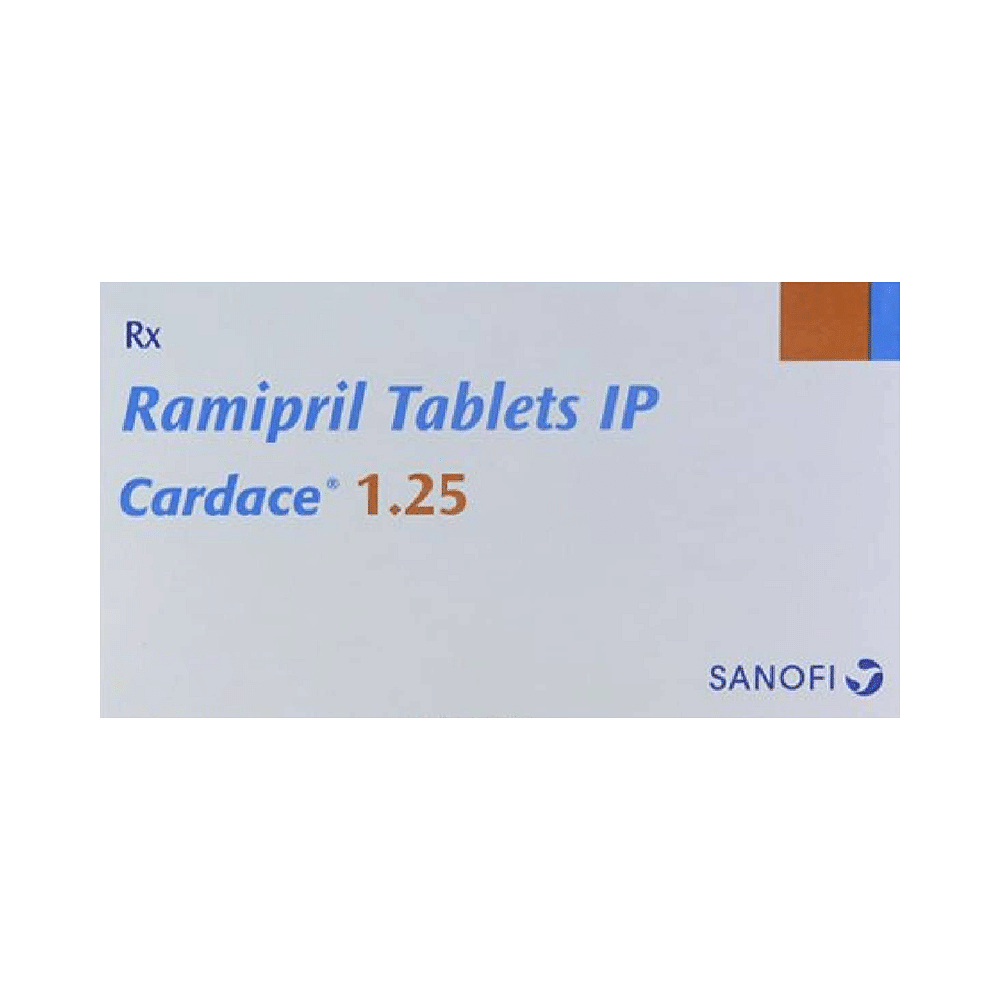
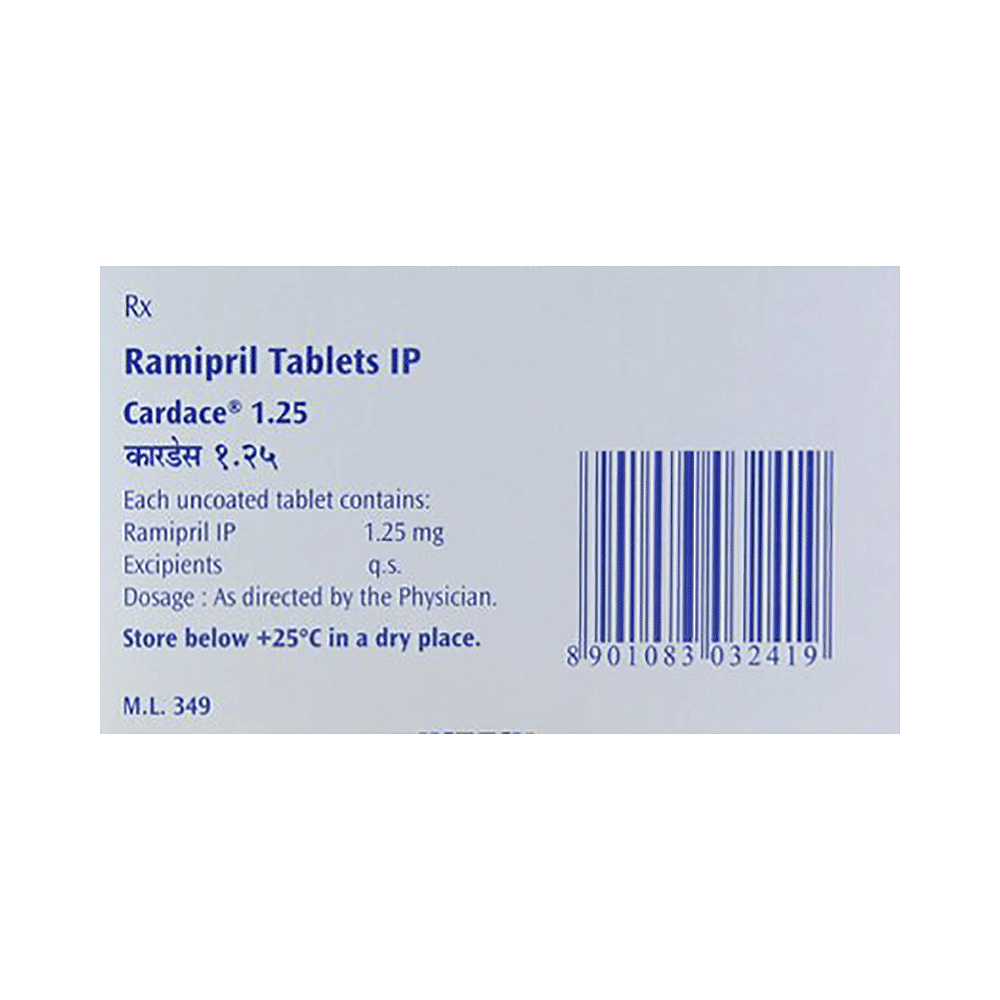
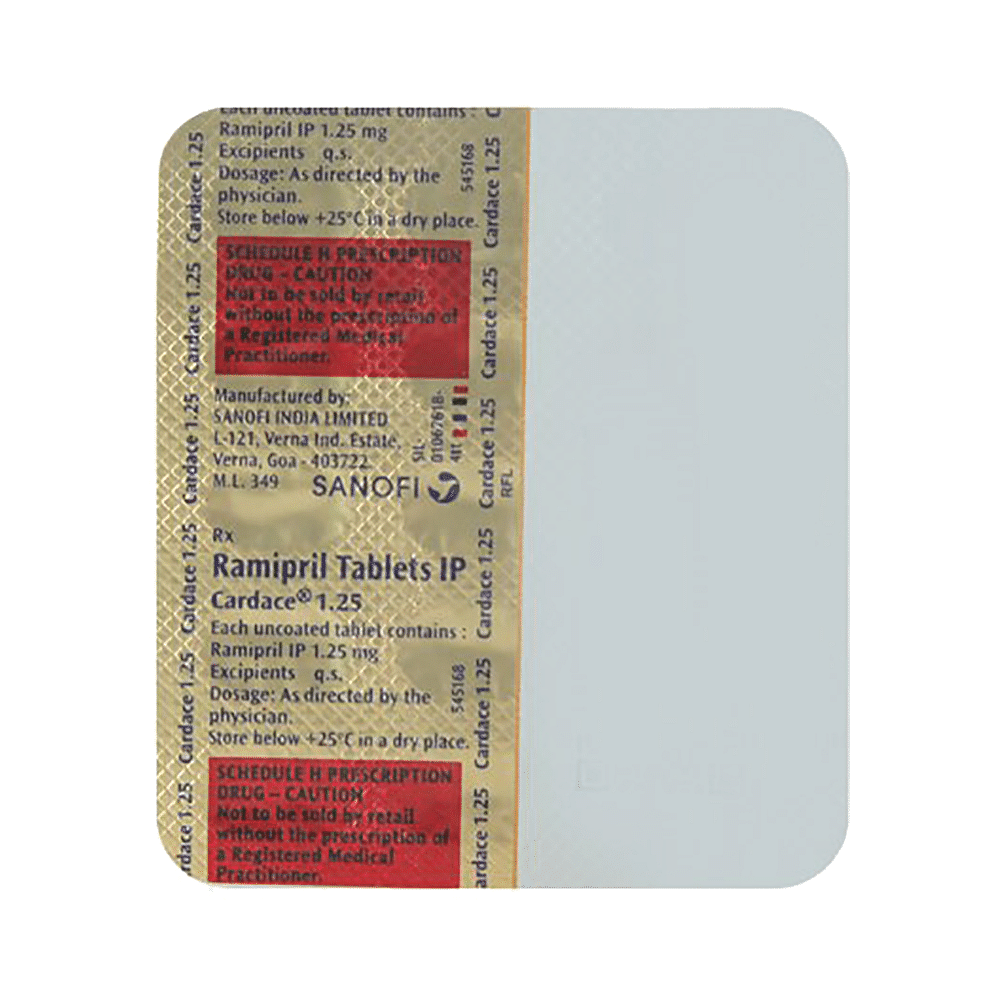
Cardace 1.25 Tablet
Manufacturer
Sanofi India Ltd
Salt Composition
Ramipril (1.25mg)
Key Information
Short Description
Cardace 1.25 Tablet is widely used to treat high blood pressure and heart failure and may even be prescribed after a heart attack. It also lowers the chances of having a heart attack or stroke.
Dosage Form
Tablet
Introduction
Cardace 1.25 Tablet may be prescribed either alone or in combination with other medicines. It can be taken on an empty stomach or with a meal. This medicine should preferably be taken at the same time each day to get the maximum benefit. It is important to continue taking it regularly even if you feel well or even if your blood pressure is controlled. Most people with high blood pressure do not feel any symptoms but if you stop taking this medicine your condition could get worse. This is a widely used medicine and is considered safe for long-term use. Making some changes in your lifestyle will also help lower your blood pressure. These may include regular exercise, losing weight, not smoking, reducing alcohol intake, and reducing the amount of salt in your diet as advised by your doctor.
Directions for Use
Take this medicine in the dose and duration as advised by your doctor. Swallow it as a whole. Do not chew, crush or break it. Cardace 1.25 Tablet may be taken with or without food but it is better to take it at a fixed time.
Safety Information
Side Effects
feeling dry cough headache fatigue
Alcohol Warning
Cardace 1.25 Tablet may cause excessive drowsiness with alcohol.
Breastfeeding Warning
Cardace 1.25 Tablet is probably unsafe to use during breastfeeding. Limited human data suggests that the drug may pass into the breastmilk and harm the baby.
Pregnancy Warning
Cardace 1.25 Tablet is unsafe to use during pregnancy as there is definite evidence of risk to the developing baby. However, the doctor may rarely prescribe it in some life-threatening situations if the benefits are more than the potential risks. Please consult your doctor.
Interacting Medicines
Allopurinol Amiloride Azathioprine Bemiparin
How it works
Cardace 1.25 Tablet is an angiotensin converting enzyme (ACE) inhibitor. It works by reducing stress on the heart and relaxing blood vessel so that blood flows more smoothly and the heart can pump blood more efficiently.
Quick Tips
Rise slowly if you have been sitting or lying down. You can also prefer taking it at bedtime to avoid dizziness throughout the day. Let your doctor know about any cough or throat irritation that does not go away. Inform your doctor if you are pregnant, planning pregnancy or breastfeeding.
Related Medicines
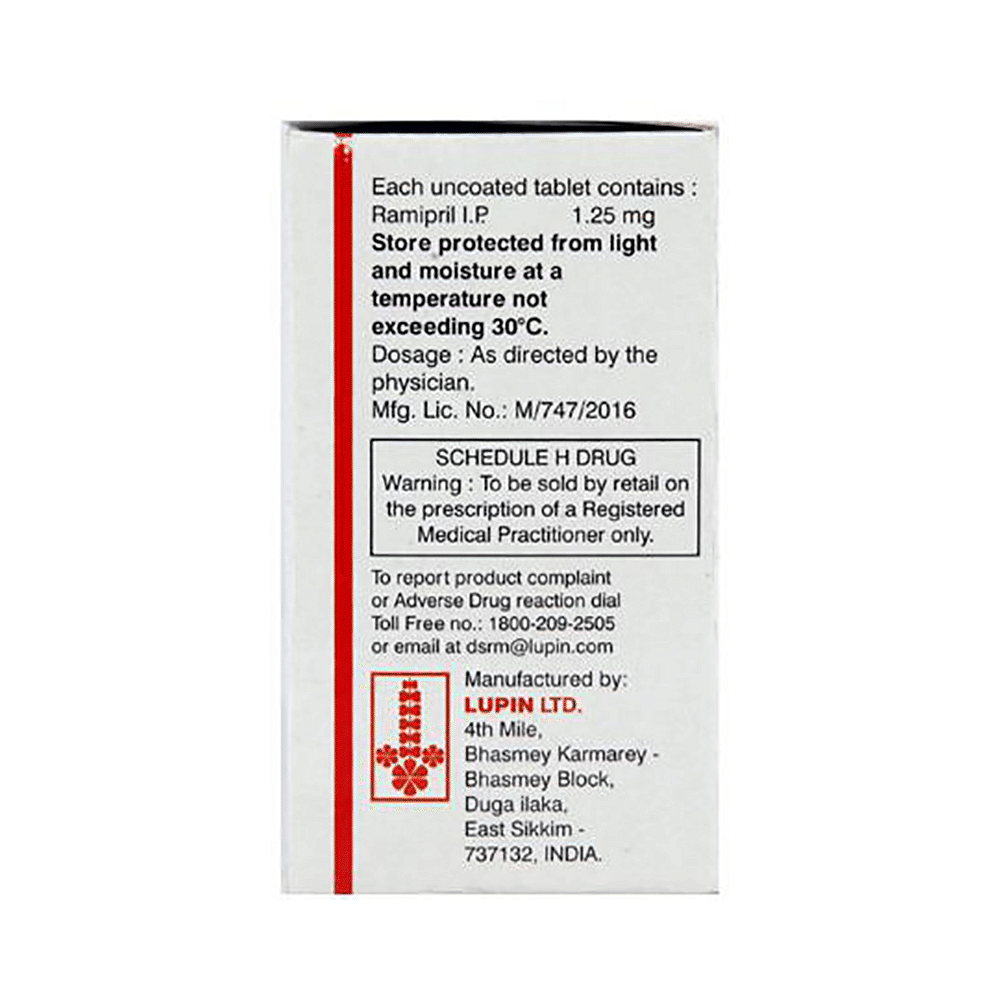
Ramistar 1.25 Tablet
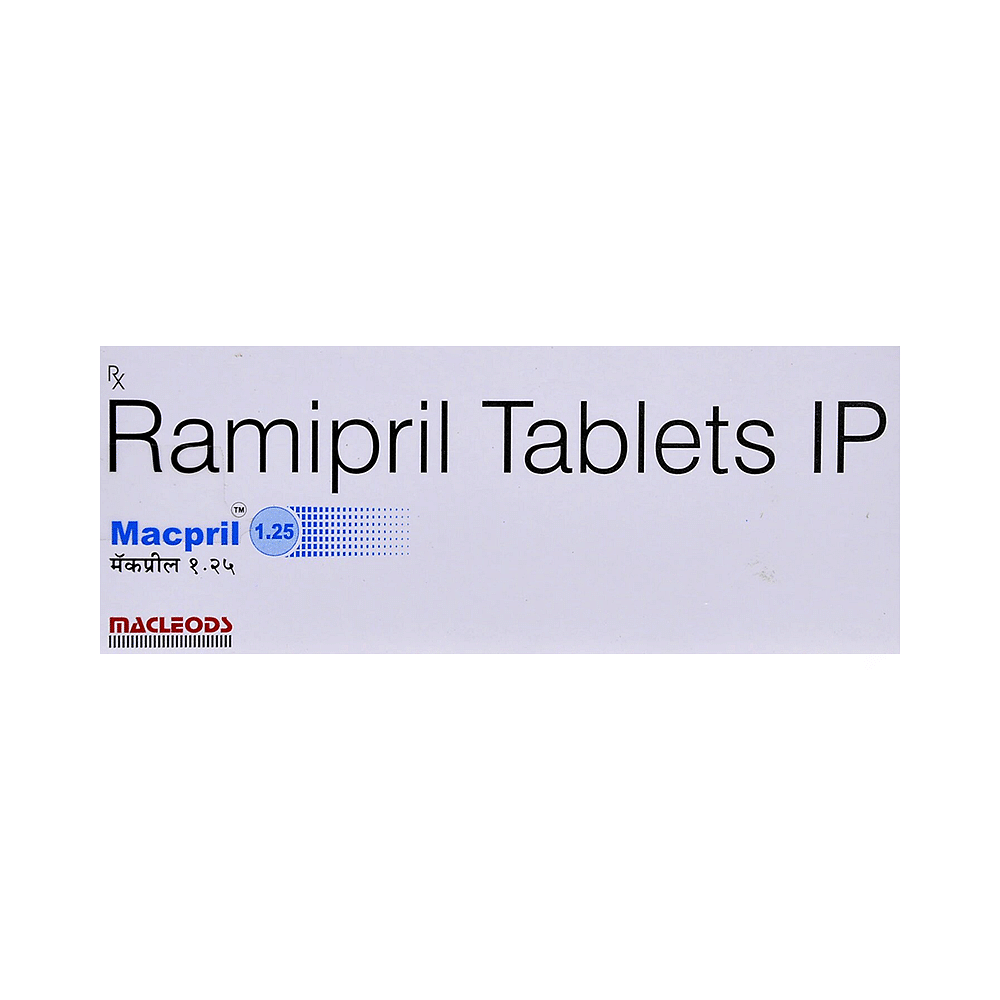
Macpril 1.25 Tablet

Raminita 1.25mg Tablet

Ramhop 1.25mg Tablet
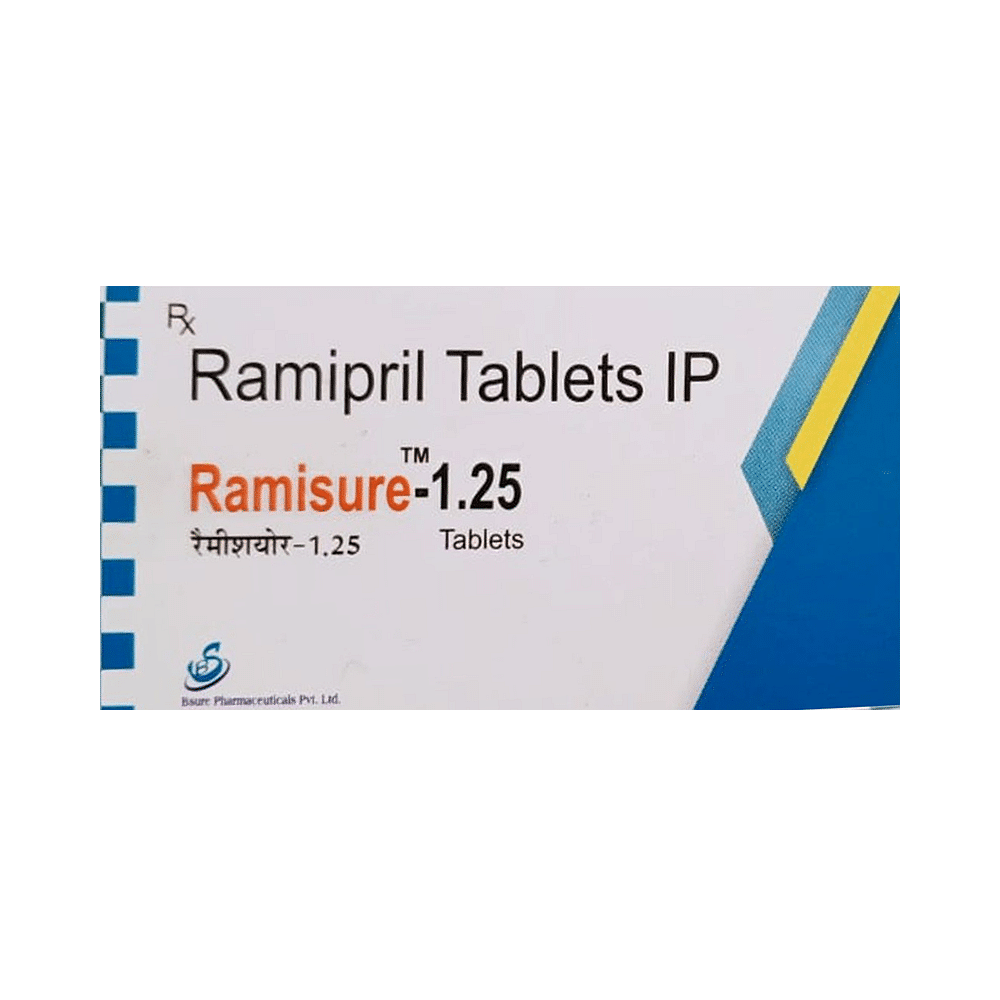
Ramisure 1.25 Tablet

Revas R 1.25mg Tablet

Hopril 1.25mg Tablet

Permil 1.25mg Tablet

Ril 1.25mg Tablet

Ramiday 1.25mg Tablet
Frequently asked questions
Why was I prescribed Cardace 1.25 Tablet for heart failure?
Cardace 1.25 Tablet is an angiotensin-converting enzyme (ACE) inhibitor that helps relax and widen blood vessels, reducing the workload on your heart. This makes it beneficial in treating heart failure.
Can Cardace 1.25 Tablet increase potassium levels?
Yes, Cardace 1.25 Tablet may cause a rise in potassium levels, particularly if you have uncontrolled diabetes mellitus, kidney issues, or dehydration. Regular blood tests are recommended to monitor this.
How long will it take for my blood pressure to be normal after starting Cardace 1.25 Tablet?
Cardace 1.25 Tablet may take a few weeks to fully control your blood pressure. It's essential not to stop taking the medicine, as this can cause a sudden increase in blood pressure.
Why did I develop a dry cough after starting Cardace 1.25 Tablet?
A dry cough is a common side effect of Cardace 1.25 Tablet. If it persists or interferes with your sleep, consult your doctor for alternative treatment options.
What should I do if I accidentally took an extra dose of Cardace 1.25 Tablet?
If you take a higher dose than prescribed, you may experience lightheadedness, dizziness, or fainting. Seek medical attention immediately.
Will taking Cardace 1.25 Tablet affect my surgery scheduled for next week?
Inform your doctor that you're taking Cardace 1.25 Tablet. This medication may reduce blood pressure when used with anesthesia, and your doctor might advise stopping it before surgery.
Can Cardace 1.25 Tablet affect my fertility?
There is no evidence that Cardace 1.25 Tablet affects fertility in either men or women. However, consult your doctor if you're planning to get pregnant, as the medication is not recommended during pregnancy.
How does Cardace 1.25 Tablet affect my diabetes?
Cardace 1.25 Tablet may lower blood sugar levels when used with antidiabetic medicines or insulin. Regularly check your blood sugar levels to monitor this effect.
Should I stop taking Cardace 1.25 Tablet if I experience a sore throat and fever?
No, do not stop taking Cardace 1.25 Tablet suddenly, as this can cause a sudden increase in blood pressure. Consult your doctor and undergo a blood test to ensure your white blood cell count is normal.
Is it safe to take Cardace 1.25 Tablet for an extended period?
Yes, Cardace 1.25 Tablet is generally safe when taken long-term. However, regular blood tests are necessary to monitor kidney function and detect any potential issues.


